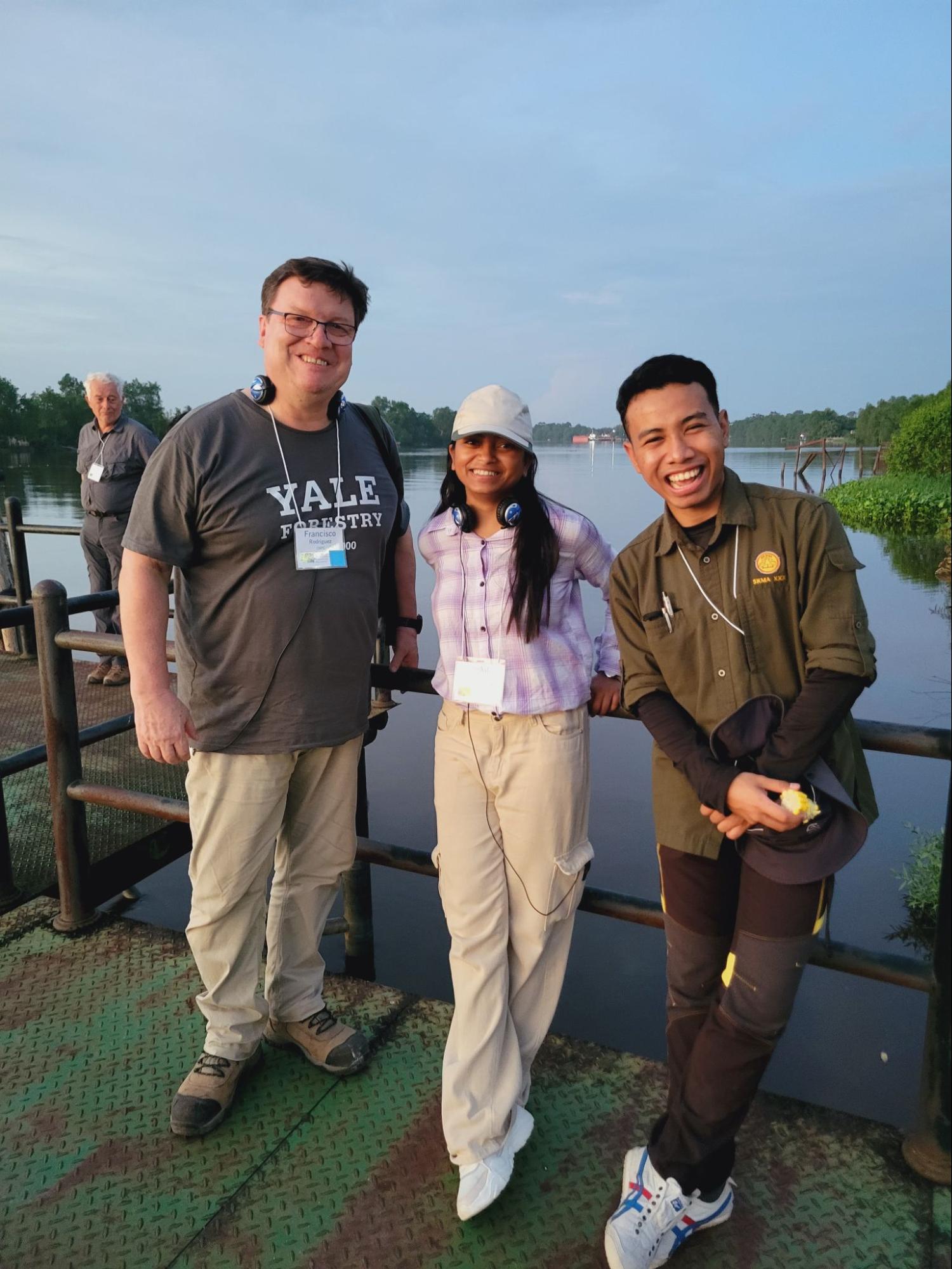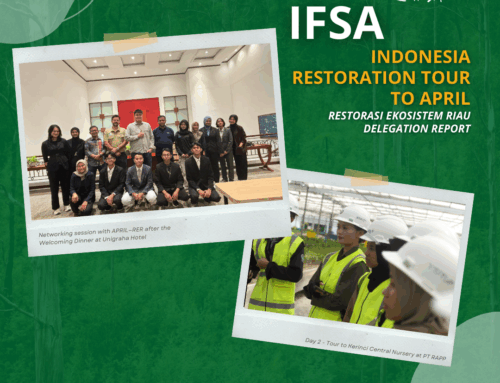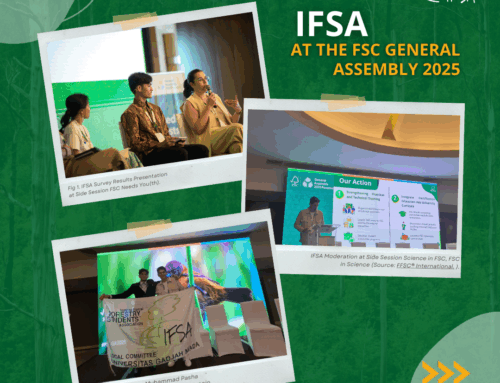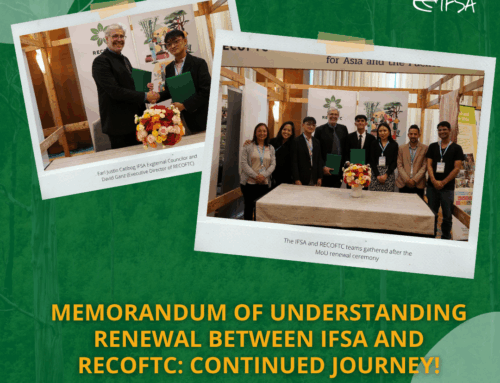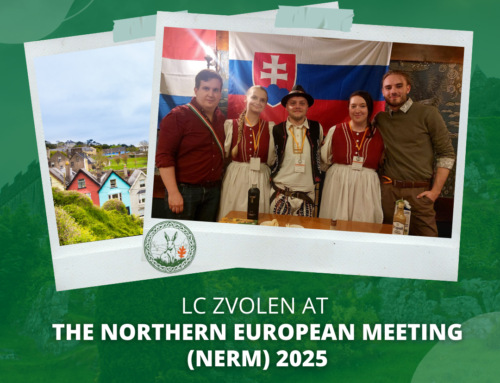Field Dialogue on Tree Plantations in the Landscape
Delegation Report – The Forests Dialogue
i. Summary of the event
The Forests Dialogue (TFD) was created in 2000. TFD is a group that brings together different people and teams worldwide to talk about managing forests sustainably and protecting them. They have initiatives like the Climate Positive Forest Products and The Land Use Dialogues, which focus on forest conservation and management aspects. One of their initiatives, Tree Plantations in the Landscape, was started in 2015 to study how tree plantations fit into the bigger picture of land use. They held a meeting in Indonesia in 2023 where professionals and stakeholders came together to discuss tree plantations, including their role in preventing climate change and deforestation. The dialogue aims to build a network of influential people who can work together to create policies related to tree plantations and protect important ecosystems like peatlands. IFSA’s involvement in the event was participants presenting youth voices.
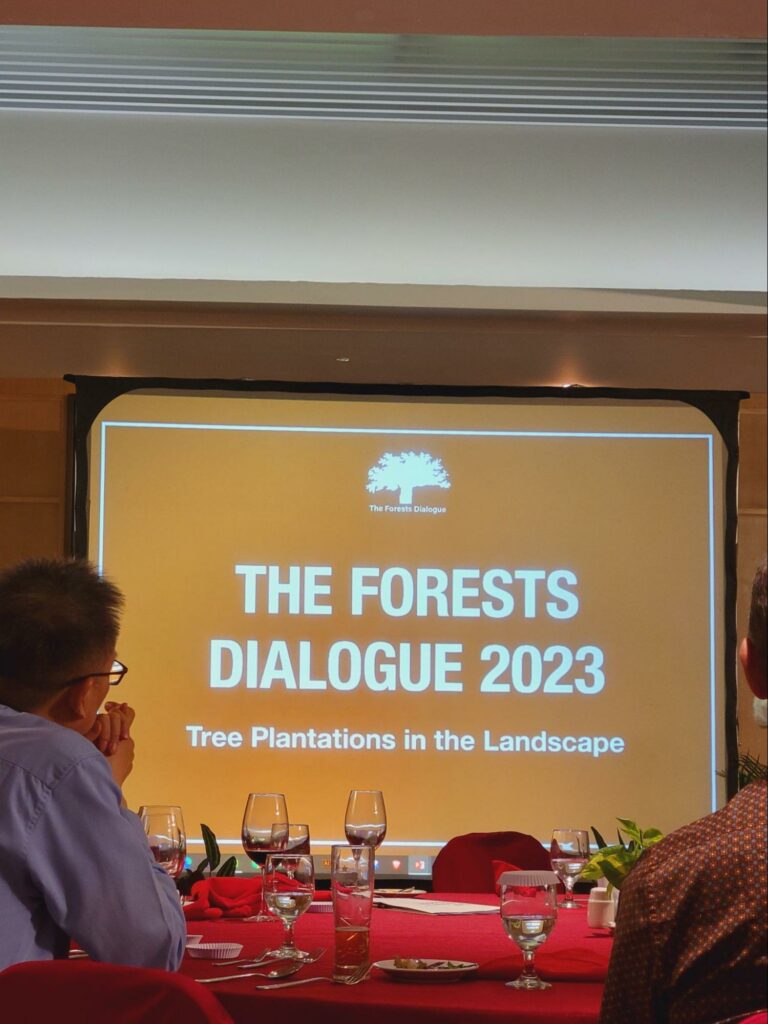
Figure 1. TFD TPL Dialogue
The objectives of the TPL Dialogue were to:
- Recognise the potential of plantation forests as part of the global development agenda, and consider/reimagine plantation forest design and execution in the context of jurisdictional and landscape approaches.
- Review approaches for promoting good governance and inclusive development.
- Identify major externalities related to plantation forest development and management.
- Learn about and support adopting new practical solutions to specific contextual difficulties.
- Investigate the diversity of plantation forest types and species composition.
ii. Delegation

Figure 2. IFSA Delegates on the TFD TPL Dialogue
IFSA sent two delegates consisting of one national and one international representative. Rizka Afif (he/his) from IFSA LC Universitas Gadjah Mada was the national delegate, while Neekita Urang (she/her), IFSA LC Forest Research Institute, was the international delegate. They both attended the dialogue in person in Riau, Indonesia.
iii. Experience
Sessions attended
Gala Dinner (12 June 2023)
The TPL Dialogue Gala Dinner allowed conference delegates and guests to mingle and enjoy featured entertainment while partaking in a delicious Indonesian-course meal. It was held in Unigraha Hotel, Pelalawan District, on June 12, 2023. There were three sessions at the gala, the opening session, dinner, and technical presentation. The first session included an opening speech from Anderson Tanoto as, RGE Managing Director of APRIL and a member of TFD TPL Co-Chair. Besides, IFSA Delegates introduced themselves after the Co-Chair’s explanation. During the dinner session, delegates featured glamorous food provided by Unigraha Hotel. After this, the last session was held. The Co-chair presented an overview of field trips and dialogue technical implementation. One of the most valuable takeaways from the Gala Dinner is the new relationships and contacts made through networking. Understanding how to network there and going in with the right strategy can be a game-changer for the IFSA connection.
Field Visits Day 1 (13 June 2023)
Field visits are participants’ hands-on-hand experience to learn outside the conference room and immerse in authentic learning. The field trips were held in two different places, which were a peatland plantation (visited by Rizka Afif) and a mineral soil plantation (visited by Neekita Urang). It allowed participants to experience novel climate impacts, management challenges in peatland and mineral soil plantation, as well as on-the-ground solutions. Yet, there was short safety induction and a glimpse of site visit presentations before the field visits.
Peatland Plantation
There are three learning materials gained on these visits:
- Conservation Efforts and Sustainable Forestry
The first field visit on peatland discussed the research and development (R&D) operations of APRIL Group. The company focuses on nurturing seedlings with higher pulp yield and better pulping properties. These seedlings are also more resilient to pests and diseases and consume less energy. APRIL aims to adopt best management practices in its operations on soil and peatlands, with the R&D Center playing a crucial role in achieving this goal. APRIL Group is a plantation company that protects high-value conservation areas from fire and illegal encroachment. On the second visit, it was explained they also create employment opportunities through sustainable plantation forestry. The company’s approach to peatland management is based on “balanced” land use, with land allocation determined by High Conservation Value (HCV) assessments and guided by public consultation and science. Buffer zones are established around conservation areas to prevent encroachment and degradation, helping to conserve peat swamp forest domes and riparian corridors.
The third visit then discusses APRIL Group’s forestry operations in Pelalawan. The company aims to grow wood in plantations rather than cutting down trees in natural forests. They conduct assessments to determine which areas should be protected and which can be used for plantations or other purposes. Of the 1 million hectares of land they manage, 480,000 hectares are used for plantations, while the rest is reserved for conservation, community use, and infrastructure. APRIL Group follows sustainable land management practices and complies with government regulations.
- Landscape-Scale Water Management
In the last session, APRIL Group explained they also implement water management on a landscape scale. They use water control weirs to maintain optimal water levels between 40-90 cm in plantations. This strategy promotes plant growth and reduces carbon emissions compared to unmanaged lands. The company also has strict policies against fires on peatland areas and collaborates with suppliers, experts, and authorities to establish guidelines for protecting carbon-rich peatland areas. They work with scientists specializing in water management, nature preservation, and greenhouse gas monitoring.
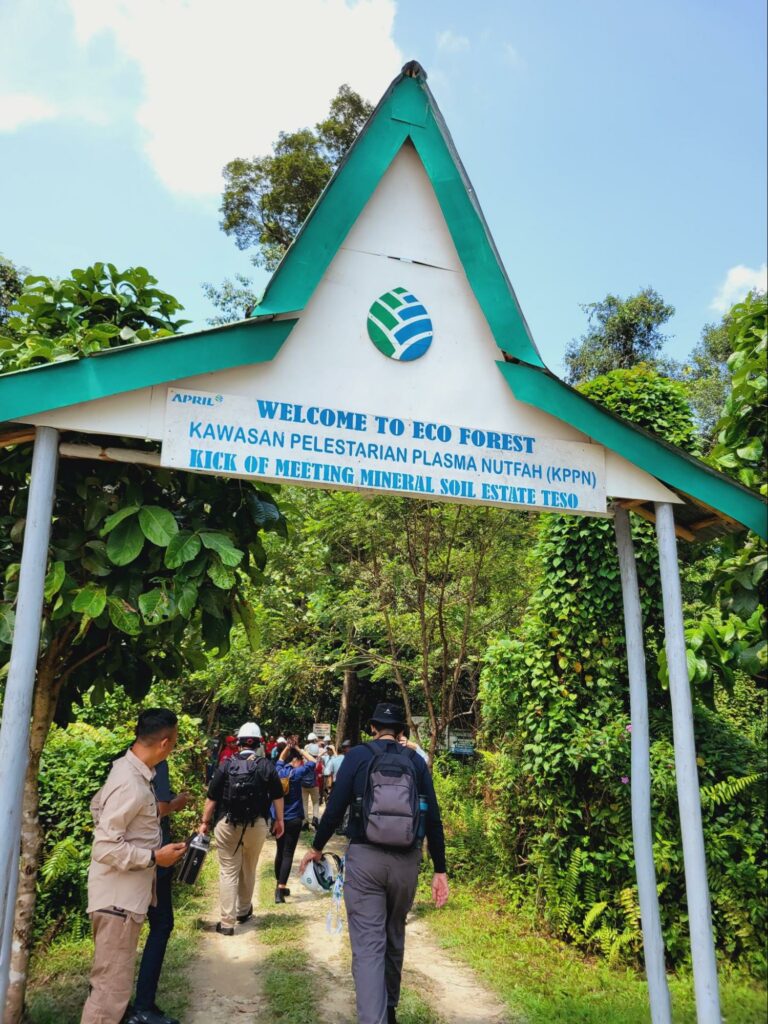
Figure 3. TFD TPL Field Visits Day 1 (Mineral Soil)
Mineral Soil Plantation
- Nursery Operations
The first field visit was to the Kerinchi Tissue Culture Lab, where APRIL Group demonstrated their specialization in tissue culture propagation techniques for Acacia & Eucalyptus species to produce disease-free and high-quality plantlets for research and development (R&D) operations for the production of disease-free and high-quality plantlets. The lab is accompanied by the Kerinchi Central Nursery which serves as a production unit for the plantlets generated through tissue culture. The plantlets, once acclimatized, are carefully transferred from the lab to the nursery for further growth and development. Various techniques are employed to control environmental factors, such as shade structures, misting systems, automated humidity roof sensors and irrigation, to ensure optimal growing conditions for the plants. Trained personnel regularly monitor the plants, and appropriate measures, including pest control and fertilization, are undertaken to ensure healthy plant growth. Once the plants reach the desired stage of maturity, they are transferred to APRIL’s mineral soil (eucalyptus) plantation.
- Sustainable Practices at Mineral Soil Estate
The second visit was to Mineral Soil Estate, TESA, an HCV area by APRIL Group, demonstrating their dedication to environmental conservation and sustainable development. The estate implemented measures to protect and enhance biodiversity. Buffer zones and wildlife corridors were established, helping identify and preserve key habitats and integrating their conservation efforts. APRIL Group follows responsible land management practices, including reforestation initiatives to restore and maintain the ecological integrity of the estate. Rigorous monitoring and compliance measures are practiced to ensure adherence to sustainable practices. The conservation efforts at Mineral Soil Estate benefit the environment and serve as a commendable model for achieving a harmonious balance between economic growth and environmental protection.
- Greenhouse gas monitoring
On the last visit of the day, there was a demonstration on APRIL Greenhouse Gas Emissions (GHG) Monitoring which is focused on two key areas – monitoring CO2, CH4, and N2O emissions and improving mineral soil management practices to reduce GHG emissions at the landscape level. The plantation and post-plantation management process of eucalyptus on mineral soil was demonstrated using machinery and apparatus. Process of tree harvesting for pulp and usage of drone technology in Remote Sensing for landscape management in mineral soil was also understood.
Field Trips Day 2 (14 June 2023)
The Fire Free Village program started in 2014 to help prevent forest fires, but now it is expanding to protect and conserve forest areas outside of the APRIL concession with the help of local communities.
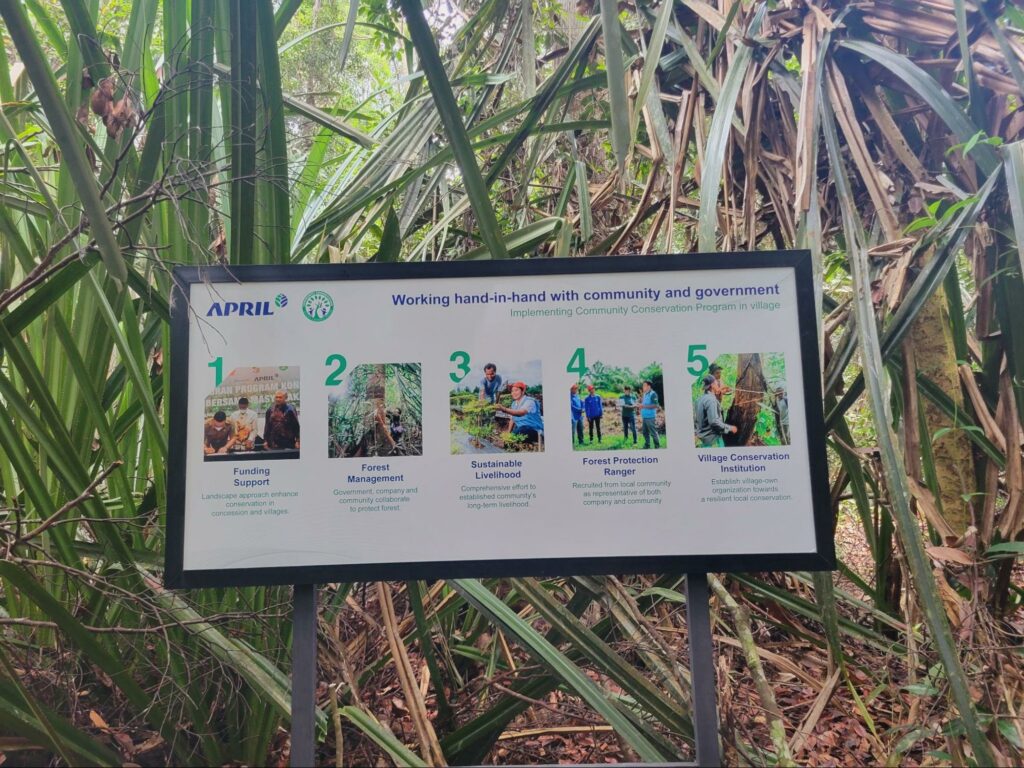
Figure 4. The Fire Free Village Program
Dayun Village
One of these is Dayun Village as the first visit of the second day. The main idea is to find big areas of natural forest in community areas that are not currently protected and offer the communities money to keep conserving these areas. Agriculture is the main threat to the forests, so the program also helps improve community farming. The communities get involved in the planning process to ensure their needs are considered, and there are rules to protect the areas. If the forests are not cut down, the communities get paid for new schools or hospitals. The program also helps the communities find ways to sustain wood so the forests can grow back.
Penyengat Village
The second visit was to Penyengat village. It is a place where a group of indigenous people called the Suku Anak Rawa have lived for a very long time. They lived off the land by hunting, fishing, and managing sago groves. They also used the forests to get medicines and other natural things they could sell. The government officially recognized the village as a special kind, but there is still some uncertainty about their rights to the land. In the past, commercial logging companies have been operating in the area, and now there is a large palm oil plantation and other businesses. These things have greatly impacted Suku Anak Rawa’s land and way of life. The government is working on solving land conflicts and considering a program to protect the community and the environment.
Kampung Tengah
The last field visit was Kampung Tengah. It is a traditional Malay village in Indonesia that has been around since the time of the Siak sultanate. The village was home to officials from the Siak Kingdom who advised the sultan. When the Dutch ruled Indonesia, they recognized the Siak sultanate’s authority, meaning local customs and laws were followed. After Indonesia gained independence, the powers of the Siak sultan were given to the Indonesian government, but the village still has its traditional leaders and institutions. The village has yet to be given formal titles for their communal lands and farmlands by the government. Most people in the village make a living through fishing and growing rice, and some also work in local businesses. There is a dispute with a palm oil company that has taken over their lands without their permission.
Dialogue Day 1 (15 June 2023)
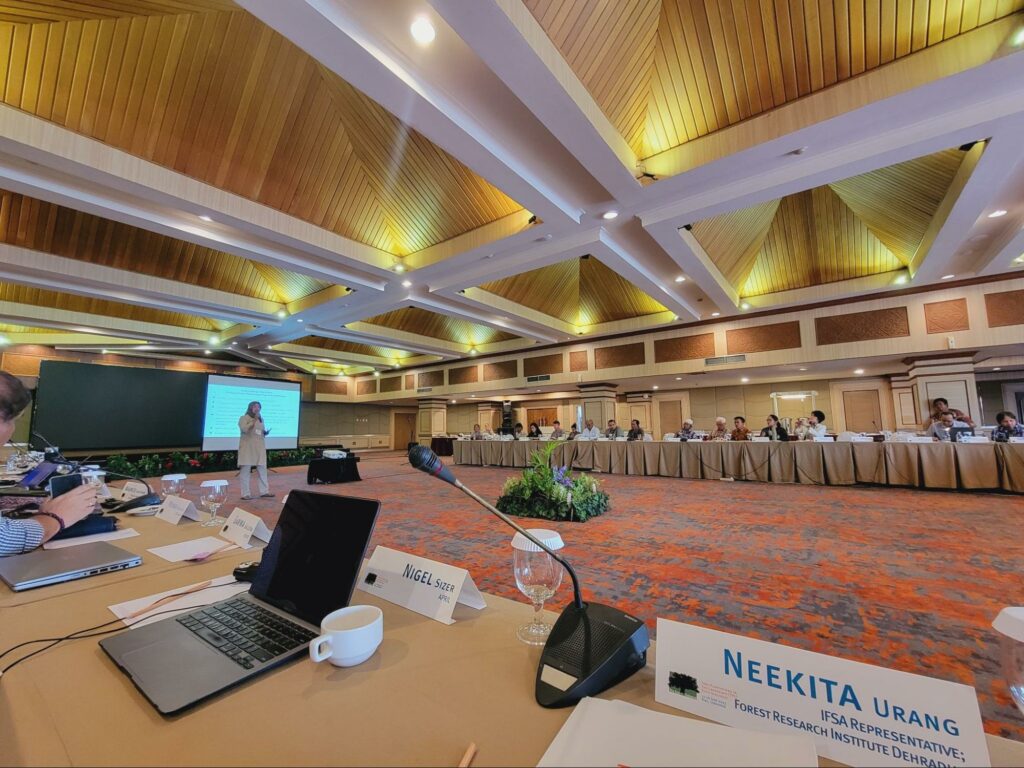
Figure 5. Dialogue Day 1
After the Field Visits, IFSA Delegates, together with other participants, gathered in Pekanbaru, Riau, to discuss issues related to social and environmental challenges. There were two main sessions: a plenary discussion and a breakout group discussion. The plenary discussion focused on the mutual exchange of one’s thoughts on sustainable production and intensification, social issues, peatland and climate, and biodiversity conservation and restoration. Afterward, the participants were split into smaller groups to discuss these topics in detail and later came together to share their ideas and thoughts. The main objective of these discussions was to find problems and challenges to the complex issues discussed. IFSA Delegates had a chance to speak about youth perspectives regarding its topics.
Dialogue Day 2 (16 June 2023)
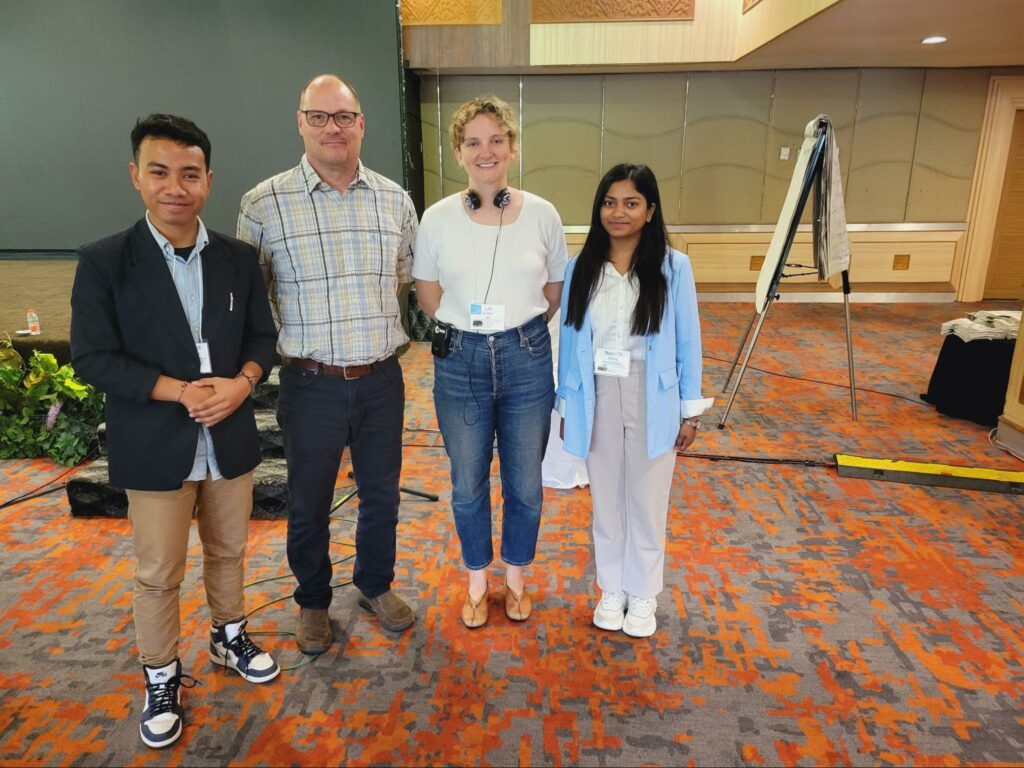
Figure 6. IFSA delegates with Gary Dunning and Liz Felker (TFD)
On the second day of dialogue, the participants started by discussing important problems related to the environment and society that came up during their visits through carousell discussion. Yet before, we split into smaller groups and came up with ideas for solving these problems. Some of the issues discussed were solutions to yesterday’s problems and challenges. They were sustainable production, intensification, social, peatland management and climate, and restoration and conservation. IFSA Delegates proposed the solution as well based on youth perspectives. At the end of the session, there was a plenary discussion to wrap up the whole dialogue, such as recognizing the rights of local communities to the land they live on, managing peatlands in a way that is proper for the landscape, and improving communication as well as teamwork between different groups interested in the same area. On plenary discussion, IFSA Delegates also had a chance to speak up in the forum.
Networking
IFSA briefly discussed a partnership with TFD, Gary Dunning, and RECOFTC, David Ganz, regarding our further involvement. They requested continuing massive communication to understand youth toward forest sustainability better. On the other hand, Bracell, through João Augusti, offered help and opportunities if IFSA members were willing to intern or work there or at other Brazilian companies. Contacts were exchanged to continue exploring these opportunities.
Knowledge gained
Two aspects were achieved: knowledge of how forest institutions in Indonesia deal with forest plantation matters under challenging conditions. In addition, we learned from the experiences of local communities (Penyengat Community, Kampung Tengah Community, Sakai People, Kampung Dayun Community, Riau Peat Community Network, etc.) and multi-stakeholders (APRIL, WWF Indonesia, RECOFTC, Bracell, Kahutindo, Yale University, University of Riau, Australian National University, University of British Columbia, Forest Peoples Programme, Green Foundation Nepal, Wildlife Conservation Society Indonesia, FSC Indonesia, Indonesian Forestry Certification Cooperation, Bahtera Alam, Asian Agri, Sappi Southern Africa, CMPC, Brazilian Forest Dialogue, Siak Government, Riau Government, etc.) in professional discussions on framework conditions for sustainable landscape management, especially for peatland in Indonesia.
Findings in Indonesia might be inspiring for us, especially for implementing sustainable production and intensification, social, peatland management and climate, as well as restoration and conservation. If not, technical approaches to dealing with these challenges can help develop appropriate solutions for other countries. Besides those kinds of special topics, the details of the institutional setup within a public forest service organisation are of major interest to introduce efficient and effective structures and procedures and develop landscape management in the tree plantation.
iv. Indicator reporting
The goals and subgoals from the IFSA Strategy 2022-2026 were accomplished.
v. Outcomes
In summary, APRIL Group conducts R&D operations to develop seedlings with higher pulp yield and better pulping properties. They protect high-value conservation areas and create employment opportunities through sustainable plantation forestry. The company follows a balanced land use approach, with land allocation based on HCV assessments and guided by science and public consultation. They implement water management and have strict policies against fires, collaborating with experts to protect carbon-rich peatland areas. As a result of the dialogue, the Co-Chair and participants’ perspectives and voices have been drafting a TFD TPL paper as a fundamental strategic document to support TFD TPL’s goals. After it is done, the TFD Organizing Committee will publish it on their website.
iv. Pictures
Outreaching activities/material
Check more information about the dialogue in the next links.
Material type: Video from IFSA
- Authors:
- Link to post: https://www.instagram.com/reel/CuHSP3btom6/
Posts from TFD:
Link to posts:
- https://www.instagram.com/p/CuDCyjguuCj/
- https://www.instagram.com/p/CtmLRj4O1Z2/
- https://www.instagram.com/p/CtkC33GOb7T/
- https://www.instagram.com/p/CthY6oyO3tq/
- https://www.instagram.com/p/Ctev1T9OXxa/
- https://www.instagram.com/p/CtZuMeLOrbw/
- https://www.linkedin.com/posts/the-forests-dialogue_ifsadotnet-ifsaxtfd-activity-7080664157737361408-Z1Zg
- https://www.linkedin.com/posts/the-forests-dialogue_tplindonesia-activity-7075857638692921344-VE5d




